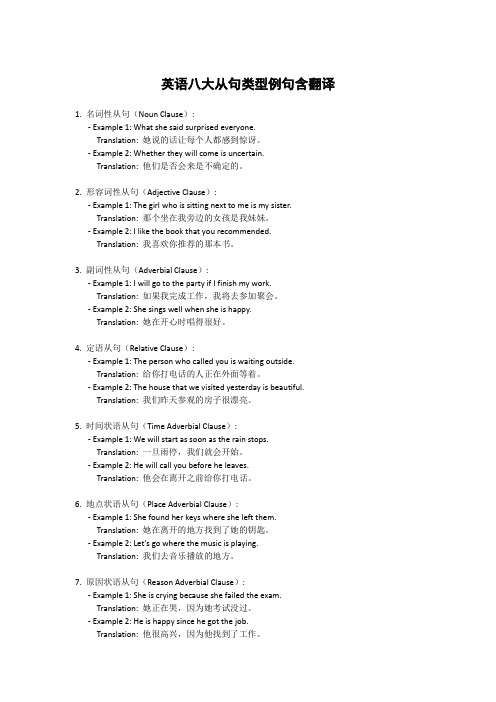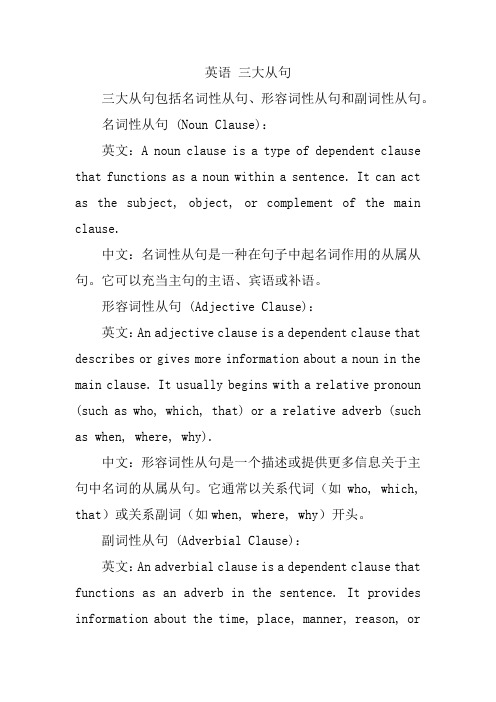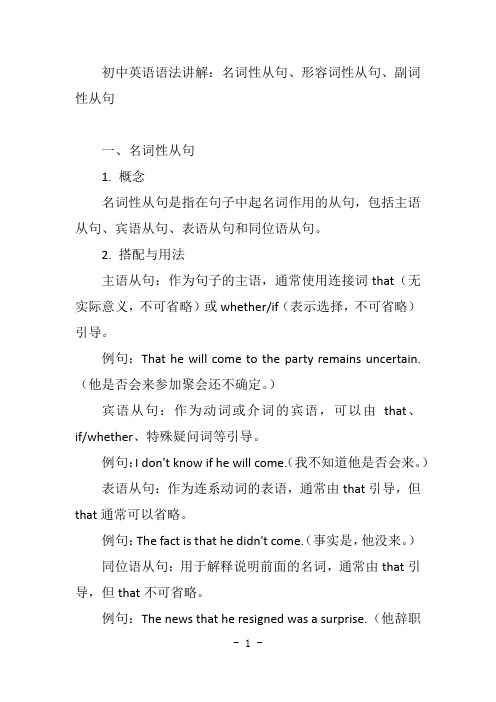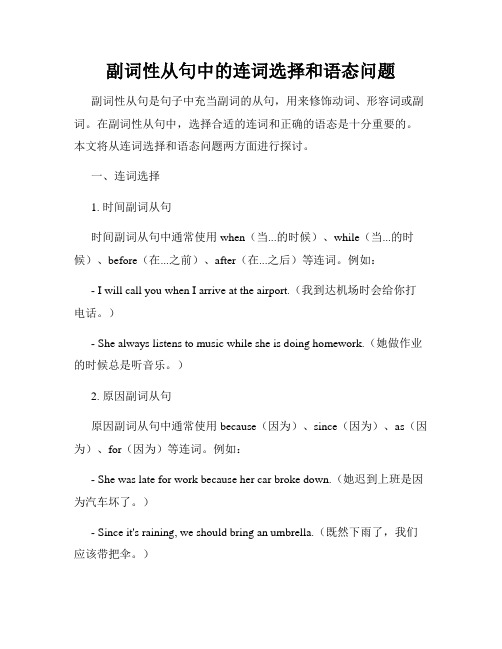副词性从句
- 格式:doc
- 大小:60.50 KB
- 文档页数:9

• 1. Adverb Clause of Time 时间状语从句•连接主从句when, while, as, before, after, until, since and as soon as 连接两个句子:at that time, at the same time, meanwhile, after that, afterwards, •连接两个句子before that, finally, then•同时发生when, while, as日子一天天过去,,天气越变越坏1 日子一天天过去As the day went on, the weather got worse.从句表示"随时间推移"连词用as,不用when 或while.我停住了车。
2 恰恰在交通灯变红时恰恰在交通灯变红时,,我停住了车Just as / When the traffic light turned red, I stopped my car.•不同时发生我陪你直到你妈妈回家。
1 我陪你直到你妈妈回家I will stay with you until your mother comes home.I won’t leave you until your mother comes home.他迅速地离开了银行。
在拿到钱后,,他迅速地离开了银行2 在拿到钱后After he had got the money, he left the bank immediately.After having got the money, he left the bank immediately.Before he had got the money, he didn’t leave the bank.Before having got the money, he didn’t leave the bank.自从我生病以来,,他就屡次给我写信他就屡次给我写信。

英语八大从句类型例句含翻译1. 名词性从句(Noun Clause):- Example 1: What she said surprised everyone.Translation: 她说的话让每个人都感到惊讶。
- Example 2: Whether they will come is uncertain.Translation: 他们是否会来是不确定的。
2. 形容词性从句(Adjective Clause):- Example 1: The girl who is sitting next to me is my sister.Translation: 那个坐在我旁边的女孩是我妹妹。
- Example 2: I like the book that you recommended.Translation: 我喜欢你推荐的那本书。
3. 副词性从句(Adverbial Clause):- Example 1: I will go to the party if I finish my work.Translation: 如果我完成工作,我将去参加聚会。
- Example 2: She sings well when she is happy.Translation: 她在开心时唱得很好。
4. 定语从句(Relative Clause):- Example 1: The person who called you is waiting outside.Translation: 给你打电话的人正在外面等着。
- Example 2: The house that we visited yesterday is beautiful.Translation: 我们昨天参观的房子很漂亮。
5. 时间状语从句(Time Adverbial Clause):- Example 1: We will start as soon as the rain stops.Translation: 一旦雨停,我们就会开始。

名词性从句与副词性从句的区别与应用名词性从句和副词性从句都属于从属从句的一种,在句子中充当不同的语法角色。
两者在功能和结构上存在一些明显的区别,本文将就名词性从句和副词性从句的区别以及它们的应用进行探讨。
一、名词性从句名词性从句是在复合句中充当名词成分的从句,可以作主语、宾语、表语、同位语等。
名词性从句的引导词有:1. 连接代词:如what, which, who, whom, whose, whoever, whomever 等。
2. 连接副词:如when, where, why, how等。
名词性从句的应用:1. 作主语:名词性从句可以作为主语,引导词可以是连接代词或连接副词。
例如:What she said is true.Why he left early remains a mystery.2. 作宾语:名词性从句可以作为及物动词或介词的宾语。
例如:I don't know what he is doing now.He is unsure of whether he can attend the meeting.3. 作表语:名词性从句可以作为系动词的表语。
例如:The question is whether we should support the proposal.4. 作同位语:名词性从句可以作为名词的同位语。
例如:The fact that he passed the exam surprised everyone.二、副词性从句副词性从句是在复合句中充当副词成分的从句,可以修饰动词、形容词、副词或整个句子。
副词性从句的引导词包括:1. 连接词:如 that, if, whether, when, where, why, how等。
2. 连接副词:如how, when, where, why等。
3. 连接介词短语:如in order that, so that等。
副词性从句的应用:1. 时间状语从句:副词性从句可以表示时间状语,修饰动词或整个句子。

写作专题:第5周副词性从句的写作副词性从句在写作中起着重要的作用,可以丰富句子结构和提升语言表达的准确性。
本文将介绍副词性从句的概念、用法和一些写作技巧。
1.副词性从句是什么?副词性从句是句子中充当副词的从句,可以修饰动词、形容词、副词或整个句子。
它通常由连词引导,如when、if、because、although等。
2.副词性从句的用法2.1 时间状语从句副词性从句可以用来表示时间状况。
例如:When I arrived at the party。
everyone was already dancing.I will call you as ___.2.2 条件状语从句副词性从句可以用来表示条件。
例如:If it rains tomorrow。
we will have to postpone the ic. She will pass the exam as long as she studies hard.2.3 原因状语从句副词性从句可以用来表示原因。
例如:I ___ I was sick.He lost weight because he went on a strict diet.2.4 让步状语从句副词性从句可以用来表示让步。
例如:Although she was tired。
___.He still loves her even though she broke his heart.3.副词性从句的写作技巧3.1 利用副词性从句来丰富句子结构通过使用副词性从句,我们可以避免句子结构单调,构建更复杂的句子。
例如:The weather was nice。
so we decided to go for a walk。
(简单句) Because the weather was nice。
we decided to go for a walk。
(复合句)3.2 注意主从句之间的逻辑连贯性副词性从句应该与主句之间有明确的逻辑关系,使文章结构连贯并表达出我们想要的意思。

副词性从句作状语和宾语补足语副词性从句是从句中的一种类型,可以作为副词的功能在句子中起到状语或宾语补足语的作用。
它能够修饰动词、形容词、副词,或者用来补充说明一个动作的方式、原因、时间等。
在英语中,副词性从句有各种不同的类型,例如时间状语从句、条件状语从句、方式状语从句、原因状语从句等。
下面将详细介绍副词性从句作为状语和宾语补足语的用法。
1. 副词性从句作状语副词性从句作状语时,它可以说明动作发生的时间、地点、原因等具体情况。
时间状语从句:He will call me when he arrives.(他到达时会给我打电话)I'll go to bed after I finish my homework.(我做完作业后会去睡觉)地点状语从句:They were eating wherever they found a seat.(他们随便找到座位就坐下吃饭)You can sit wherever you like.(你可以坐在你喜欢的任何地方)原因状语从句:They went home because it was raining heavily.(因为下大雨,他们回家了)She smiled as she saw her friend.(她看见朋友时笑了)方式状语从句:He learns English as if he were a native speaker.(他学英语的方式像是一个母语者)She opened the door as though nothing had happened.(她打开门好像什么都没发生过)条件状语从句:If it rains tomorrow, we will stay at home.(如果明天下雨,我们会呆在家里)I'll lend you the money provided that you pay me back next week.(只要你下周还我钱,我就借给你)2. 副词性从句作宾语补足语副词性从句还可以作为宾语补足语,对于某些表示思考、感觉、告知、建议等的动词起到补充说明的作用。

1.在我最需要你的时候,却哪都找不到你。
You are nowhere to be found when I need you most.2.当客户提出要更高的折扣,否则免谈时,我并不感到惊讶。
I was not surprised when our client said there would be no deal unless he could get a bigger discount. /It did not surprise me when our client said there would be no deal unless we gave him a bigger discount.3.等我说完你再说。
You can speak after I finished my words./Hear me out before you saying anything.4.我觉得最好别当老板心情恶劣时向他要求加薪。
I think you’d better not ask the boss for a pay rise when he is in a bad mood. /I don’t thin k you should ask the boss for a pay increase when he is in a bad mood.5.万事开头难。
Everything is difficult at(in) the beginning. /The beginning is the most difficult part of any work. /All things are difficult before they are easy.6.居移气,养移体。
One’s position alt ers the temperament,just as nourishment affects the body./Honors change manners.7.人不可貌相,海水不可斗量。

副词性从句中的时态和语序问题副词性从句是句子中充当副词的从句,在句子中对动词、形容词或其他副词进行修饰和限定。
在使用副词性从句的时候,我们需要注意时态和语序的问题。
本文将就副词性从句中的时态和语序问题展开探讨。
一、时态问题在副词性从句中,时态应与主句保持一致。
具体而言,有以下几种情况:1. 当主句是一般现在时或将来时时,从句一般使用一般现在时,表示与主句同时或将来发生的动作或状态。
例如:She said (that) she is feeling tired.(她说她感到累。
)I will tell him (that) you are coming.(我会告诉他你要来。
)2. 当主句是一般过去时时,从句一般使用过去完成时,表示在主句发生之前已经完成的动作或状态。
例如:He told me (that) he had finished his homework.(他告诉我他已经完成了作业。
)3. 当主句是现在完成时、现在进行时或将来进行时时,从句使用一般现在时,表示与主句同时或经常性发生的动作或状态。
例如:I hope (that) you have a good time.(我希望你玩得开心。
)He says (that) he is working on a new project.(他说他正在进行一个新项目。
)4. 当主句是过去完成时、过去进行时或将来完成时时,从句使用过去完成时,表示在主句发生之前已经完成的动作或状态。
例如:I knew (that) they had already left.(我知道他们已经离开了。
)二、语序问题在副词性从句中,语序与主句的语序保持一致,即陈述语序。
具体而言,我们需要注意以下几点:1. 当副词性从句放在主句前面时,它通常不需要倒装。
例如:I will go wherever you go.(你去哪儿我就去哪儿。
)He told me that he had never been to China.(他告诉我他从未去过中国。

句子成分分析名词性从句形容词性从句和副词性从句的句子结构剖析在语法学中,句法分析是对句子结构的研究和解析,包括句子成分和句子成分之间的关系。
本文将对名词性从句、形容词性从句和副词性从句这三种常见的从句进行句子结构剖析,以帮助读者更好地理解和运用这些从句。
1. 名词性从句名词性从句在句子中担任名词的成分,通常用来作主语、宾语、表语或同位语。
它可以由连接词"that"引导,也可以由"wh-"系列引导(如who、whom、whose、which、what等),甚至可以由whether或if引导。
名词性从句的句子结构较为简单,通常是一个完整的句子,与主句之间存在一定的从属关系。
下面是一些例子:- 主语从句:That he is late surprises me.(他迟到了让我吃惊。
)- 宾语从句:I know who did it.(我知道是谁干的。
)- 表语从句:My wish is that he may succeed.(我希望他能成功。
)- 同位语从句:The fact that she passed the exam excited her.(她通过了考试的事实让她很激动。
)2. 形容词性从句形容词性从句用来修饰名词或代词,并且起到形容词的作用。
一般由关系代词(如who、whom、whose、which、that等)引导。
形容词性从句常位于被修饰词后面,起到限定或描述的作用。
下面是一些例子:- The book that is on the table is mine.(在桌子上的那本书是我的。
)- The person who borrowed my phone is my friend.(借了我的手机的人是我的朋友。
)- I like the movie which is based on a true story.(我喜欢那部根据真实故事改编的电影。

英语三大从句的连接词三大从句是名词性从句、形容词性从句和副词性从句。
这些从句在英语中通过连接词来连接主句和从句。
下面是一些常用的连接词,用于连接名词性从句、形容词性从句和副词性从句。
1.名词性从句连接词:•That:常用于名词性从句中,作为连接词,引导主句和从句之间的关系。
例如:"I believe that he is honest."(我相信他是诚实的。
)•Whether:常用于名词性从句中,表示选择或两个可能性。
例如:"I don't know whether he will come or not."(我不知道他是否会来。
)•If:常用于名词性从句中,表示条件或假设。
例如:"I wonder if he is coming to the party."(我想知道他是否来参加派对。
)•Who:常用于名词性从句中,引导主句和从句之间的关系,用于指代人。
例如:"I don't know who she is."(我不知道她是谁。
)2.形容词性从句连接词:•That:常用于形容词性从句中,表示陈述或说明。
例如:"She is happythat she passed the exam."(她很高兴她通过了考试。
)•Who:常用于形容词性从句中,用于指代人。
例如:"I admire people who are hardworking."(我钦佩勤奋的人。
)•Which:常用于形容词性从句中,用于指代物。
例如:"This is the book which I borrowed from the library."(这是我从图书馆借来的书。
)•Whose:常用于形容词性从句中,用于指代所有权关系。
例如:"This isthe boy whose father is a doctor."(这是一个父亲是医生的男孩。

英语三大从句三大从句包括名词性从句、形容词性从句和副词性从句。
名词性从句 (Noun Clause):英文:A noun clause is a type of dependent clause that functions as a noun within a sentence. It can act as the subject, object, or complement of the main clause.中文:名词性从句是一种在句子中起名词作用的从属从句。
它可以充当主句的主语、宾语或补语。
形容词性从句 (Adjective Clause):英文:An adjective clause is a dependent clause that describes or gives more information about a noun in the main clause. It usually begins with a relative pronoun (such as who, which, that) or a relative adverb (such as when, where, why).中文:形容词性从句是一个描述或提供更多信息关于主句中名词的从属从句。
它通常以关系代词(如who, which, that)或关系副词(如when, where, why)开头。
副词性从句 (Adverbial Clause):英文:An adverbial clause is a dependent clause that functions as an adverb in the sentence. It provides information about the time, place, manner, reason, orcondition of the action in the main clause.中文:副词性从句是一个在句子中起副词作用的从属从句。

副词性从句因为从句起着名词、形容词和副词的作用,所以一些语法学家把从句分为名词从句(noun clause)、形容词从句(adjective clause)和副词从句(adverb clause);但从句同时也起着句子成分的作用,因而也有一些语法学家把从句分为主语从句(subject clause)、宾语从句(object clause)和状语从句(adverbial clause)。
由此可以看出,副词从句和状语从句是同一概念两种表达术语。
副词从句是在句中起副词作用的主谓结构,它可以修饰主句中的动词(a)、形容词和副词(b)或整个主句(c):a. He asked me to stay where I was.Don't come before we are ready for you.I'll go wherever the party sends me.b. She has made greater progress than we expected.Winter came earlier than it ever did before.He speaks so clearly that we understand every word he says.c. No matter what the others may say, I stick to my opinion.Seeing that the weather has improved, we shall be able to enjoy our game.副词从句可以用来表示地点、时间、原因、比较、让步、目的和结果等意义。
21.1 表示时间、地点的副词从句(Clauses of time and place)21.1.1 由when, while, as; until, not until; before, after; whenever等引导的副词从句a. when, while, as意为"当…时候"。

副词性从句时间状语从句常用引导词:when, as, while, as soon as, before, after, since , till, until特殊引导词:the minute, the moment, the second, every time, the day,the instant(瞬间,顷刻), immediately , directly(不久,立即), no sooner …than(一...就...), hardly …when(刚一...就...), scarcely … when(几乎没有……的时候)I didn’t realize how great my mother was until I became a mother.直到我成为了一个成年人我才意识到我的母亲是多么的特殊。
While John was watching TV, his wife was cooking.当约翰在看电视时,他的妻子正在做饭。
The children ran away from the orchard(果园), the moment they saw the guard.孩子们一看到守卫就逃走了。
No sooner had I arrived home than it began to rain.还没等我到家就开始下雨了。
Every time I listen to your advice, I get into trouble.每当我听取你的建议的时候,我就会惹上麻烦。
地点状语从句常用引导词:where特殊引导词:wherever, anywhere, everywhereGenerally, air will be heavily polluted where there are factories.一般来说,有工厂的地方空气污染就严重Wherever you go, you should work hard.无论你去哪里,你应该努力工作地点状语从句一般由连接副词where, wherever等引导,已经形成了固定的句型,例如:Where there is no rain, farming is difficult or impossible.在没有雨水的地方,耕作是困难的,或根本不可能的。

状语从句状语从句主要用来修饰主句或主句的谓语。
一般可分为十大类,分别表示时间、地点、原因、目的、结果、条件、让步、比较、方式和程度。
1.时间状语从句常用引导词:when, as, while, as soon as, while, before, after, since , till, until特殊引导词:the minute, the moment, the second, every time, the day,the instant, immediately , directly, no sooner …than, hardly …when, scarcely …when1).While John was watching TV, his wife was cooking.2).The children ran away from the garden the moment they saw the guard.3).No sooner had I arrived home than it began to rain.(倒装语序)4).Every time I listen to your advice, I get into trouble.比较until和till此两个连词意义相同。
肯定形式表示的意思是"做某事直至某时",动词必须是延续性的。
否定形式表达的意思是"直至某时才做某事"。
动词为延续性或非延续性都可以。
正确使用这两个连词的关键之一就在于判断句中的动词该用肯定式还是否定式。
肯定句:I slept until midnight. 我一直睡到半夜时醒了。
Wait till I call you. 等着我叫你。
(肯定句中可用before代替Let's get in the wheat before the sun sets.)否定句:She didn't arrive until 6 o'clock. 她直到6点才到。

英语八大从句类型总结总结:从句是构成复合句的一部分,也是英语语法中非常重要的部分。
根据从句的用途和功能,可以将从句分为八大类型,分别是名词性从句、形容词性从句、副词性从句、定语从句、宾语从句、主语从句、表语从句和同位语从句。
每种从句都具有自己的特点和用法,下面将逐一介绍。
1. 名词性从句(Noun Clauses):名词性从句可作主语、宾语、表语和同位语等。
其引导词有that, whether, if, what, who, whom, which, whoever, whatever, whenever, wherever等。
名词性从句在句子中起到名词的作用,可代替一个名词短语或单个名词。
例句:- I don't know what he is doing.(主语从句)- Can you tell me where the library is?(宾语从句)- His question is whether we can finish the project on time.(表语从句)2. 形容词性从句(Adjective Clauses):形容词性从句用来修饰名词或代词,通常位于其所修饰的名词或代词之后。
其引导词有that, who, whom, which等。
例句:- The book that you lent me is very interesting.(修饰名词book)- I know a girl who can play the piano very well.(修饰名词girl)3. 副词性从句(Adverb Clauses):副词性从句用来修饰动词、形容词或副词,通常位于句子中的谓语动词之后。
根据从句的用途和功能,副词性从句可以分为条件状语从句、时间状语从句、地点状语从句、方式状语从句、目的状语从句、结果状语从句和比较状语从句等。
例句:- If it rains tomorrow, we won't go to the park.(条件状语从句)- He has lived in New York since he moved there ten years ago.(时间状语从句)- She looked for her keys everywhere she could think of.(地点状语从句)4. 定语从句(Relative Clauses):定语从句用来修饰名词或代词,通常位于其所修饰的名词或代词之后。



初中英语语法讲解:名词性从句、形容词性从句、副词性从句一、名词性从句1. 概念名词性从句是指在句子中起名词作用的从句,包括主语从句、宾语从句、表语从句和同位语从句。
2. 搭配与用法主语从句:作为句子的主语,通常使用连接词that(无实际意义,不可省略)或whether/if(表示选择,不可省略)引导。
例句:That he will come to the party remains uncertain.(他是否会来参加聚会还不确定。
)宾语从句:作为动词或介词的宾语,可以由that、if/whether、特殊疑问词等引导。
例句:I don't know if he will come.(我不知道他是否会来。
)表语从句:作为连系动词的表语,通常由that引导,但that通常可以省略。
例句:The fact is that he didn't come.(事实是,他没来。
)同位语从句:用于解释说明前面的名词,通常由that引导,但that不可省略。
例句:The news that he resigned was a surprise.(他辞职的消息是个惊喜。
)3. 注意事项宾语从句中,当主句的谓语动词是think、believe、expect、suppose等表示心理活动的动词时,如果宾语从句表示的是事实,则宾语从句的否定通常要转移到主句上来表达。
例句:I don't think he will come.(我认为他不会来。
)在名词性从句中,一般不使用疑问句语序,而是使用陈述句语序。
例句:Can you tell me how I can get to the park?(请告诉我如何去公园?)而不是Can you tell me how can I get to the park?二、形容词性从句(定语从句)1. 概念形容词性从句,也称为定语从句,用于修饰或限定一个名词或代词,描述这个名词或代词的性质或特征。

副词性从句中的连词选择和语态问题副词性从句是句子中充当副词的从句,用来修饰动词、形容词或副词。
在副词性从句中,选择合适的连词和正确的语态是十分重要的。
本文将从连词选择和语态问题两方面进行探讨。
一、连词选择1. 时间副词从句时间副词从句中通常使用when(当...的时候)、while(当...的时候)、before(在...之前)、after(在...之后)等连词。
例如:- I will call you when I arrive at the airport.(我到达机场时会给你打电话。
)- She always listens to music while she is doing homework.(她做作业的时候总是听音乐。
)2. 原因副词从句原因副词从句中通常使用because(因为)、since(因为)、as(因为)、for(因为)等连词。
例如:- She was late for work because her car broke down.(她迟到上班是因为汽车坏了。
)- Since it's raining, we should bring an umbrella.(既然下雨了,我们应该带把伞。
)3. 地点副词从句地点副词从句中通常使用where(在哪里)、wherever(无论在哪里)等连词。
例如:- I will meet you at the place where we had lunch yesterday.(我会在我们昨天吃午饭的地方见你。
)- You can go wherever you want.(你可以去任何你想去的地方。
)二、语态问题在副词性从句中,语态的选择要根据主句的语态来决定。
一般情况下,如果主句是主动语态,副词性从句使用主动语态;如果主句是被动语态,副词性从句使用被动语态。
例如:- He told me that he would finish the report tomorrow.(他告诉我他明天会完成报告。
因为从句起着名词、形容词和副词的作用,所以一些语法学家把从句分为名词从句(noun clause)、形容词从句(adjective clause)和副词从句(adverb clause);但从句同时也起着句子成分的作用,因而也有一些语法学家把从句分为主语从句(subject clause)、宾语从句(object clause)和状语从句(adverbial clause)。
由此可以看出,副词从句和状语从句是同一概念两种表达术语。
副词从句是在句中起副词作用的主谓结构,它可以修饰主句中的动词(a)、形容词和副词(b)或整个主句(c):a. He asked me to stay where I was.Don't come before we are ready for you.I'll go wherever the party sends me.b. She has made greater progress than we expected.Winter came earlier than it ever did before.He speaks so clearly that we understand every word he says.c. No matter what the others may say, I stick to my opinion.Seeing that the weather has improved, we shall be able to enjoy our game.副词从句可以用来表示地点、时间、原因、比较、让步、目的和结果等意义。
21.1 表示时间、地点的副词从句(Clauses of time and place)21.1.1 由when, while, as; until, not until; before, after; whenever等引导的副词从句a. when, while, as意为"当…时候"。
when和as可以表示"点时间",也可以表示"一段时间";while只能表示"一段时间"。
--When he arrives he'll tell us all about the match.--When she was a child, she lived in Shanghai.--While he shaved he thought about the coming interview.--As they were talking, the rain began. .--As I left the house I remembered the key. .--As she came to know him better she relied on him more. .--As it grew darker it became colder. .注意:1.as多用来连接两个逐渐发展或演变的动作或状态。
例如:We advance in experience as weadvance in years.2.当as意为"当…时候"时,主要与表示动作或发展过程的动词连用,一般情况下它不与下列动词连用:表示感觉的动词如feel, taste, smell等;表示感情和情绪的动词如admire (respect), appreciate (= value), desire, fear, hate等;表示精神活动的动词如:agree, believe, mean, know,recall, remember, suppose, understand等;表示拥有的动词如belong, own, possess等。
b. till, until当till和until引导的从句在主句后,且主句的谓语动词含有come, finish, go, reach, return, start等一时性动作动词时,主句的谓语用否定形式,即not… till (unt il),其意为"直到…才"。
--I asked Peter not to sign the agreement until he has heard from us. .--He didn't reach the station until after the train had left. .--I am afraid I can not finish the work till he arrives.当主句的谓语是表持续性的动词如:remain, stay, wait等时,主句谓语用肯定形式:--I'll stay till you come back. .--Let's wait until the rain stops. .--We ran and ran, till I thought my heart would burst. .在句首时,多用until:--Until you told me, I had no idea of it.--Not until I had read your letter did I understand the true state of affairs. .--Not until he came back did I know it.not until常用于"It was not until… that…"这一强调结构中:--It was not until I had read your letter that I understood the true state of affairs.--It was not until he came back that I knew it.注意:1.在多数情况下,till和untill可以通用。
2.在till和until所引导的从句中,谓语不可用shall, will或would。
c. before, afterbefore和after可以用just, right, immediately, sometime, a long time等修饰语修饰,以表示精确的时间。
--I took the examination a year before my brother did. .--He was still tired even after he had had eight hours of sleeping. .--I'll do it after I finish this work.before和after可作介词、副词。
--He was killed in a car accident four years after their marriage.--Please come before 5 o'clock.--I never met him before.--Let me go in and you follow after.注意:before作介词用,在表示时间时,不可接一段时间,须接一特定的点时间。
d. whenever(无论何时)whenever主要用于引导一个频度状语,表示该情景是重复出现的:--It rains whenever we are camping.--Whenever that man says "To tell you the truth", I suspect that he's about to tell a lie.--Whenever we met with difficulties, they came to help us.whenever引导的时间副词从句时常兼有让步的含义,有时让步的意味比时间的意味还强。
例如:--I'll discuss it with you whenever you like.--I'd like to see you whenever it's convenient.注意:在口语中常用every time代替whenever--You get younger every time I see you.--Every time I catch a cold, I have pain in my back.21.1.2 由as long as, every time, each time, next time, last time等引导的时间副词从句as long as意为"在…的时候";every time意为"每次";each time意为"每逢…的时候";next time意为"下次";last time意为"上次";by the time意为"在…时候以前"。
--You can never enter this house as long as I live in it.(我住在这里的时候,你永远不许进入这个房子。
)--As long as (= while) I live, you will not want for anything.(只要我活在世上,你就不会缺乏任何东西。
)as long as引导的从句有很强的条件含义:--I'm happy as long as my children are.--He'll continue working so long as he has the strength.--She smiles every time she sees me.--Each time she got into trouble, she would ask me for help.--I'm going to see him next time he comes to Shanghai.--He had impressed me the way the first time I met him.(我第一次碰到他时他就给我这个印象。
)--By the time the alarm went off, I was awake.--Last time I saw Mary, she said he was going to France.21.1.3 由once, as soon as, the moment (that), the instant (that), the minute (that), directly,immediately, instantly引导的副词从句该词组引导的副词从句表示主句的动作在从句的动作一瞬间之后。